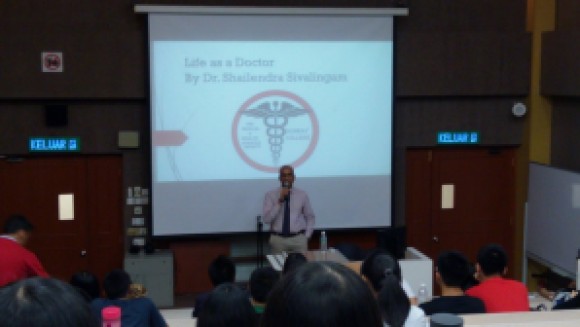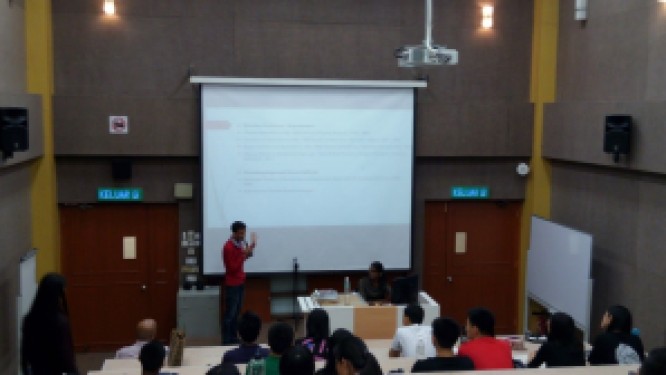By: Sim Wan Yong
Dr Shailendra Sivalingam, who specializes in otorhinolaryngology or the ears, nose and throat (ENT) region, gave the Sunway students a very enlightening talk about his life as a doctor with questions and answers that geared students up for the future.

Q : How is it like being a doctor?
A : It’s far from the dramas you watch on the TV, finding rare diseases and all. There’s just about no social life at all being a doctor. On normal working days my working hours as a house officer are from 7a.m. to 6 or 7p.m. and if I’m on call, I’ll have to work an additional 24 hours.
Being a doctor is not a glamorous life. You can ask any doctor, and they will all tell you the same thing. Only about 0.5% of the time will you come across intense emergencies, and you have to always be prepared to learn. This might be a surprise to you, but the studies are not so much an indicator to how good a doctor you will be. Most top surgeons are just average in their studies, while the ones with good academic reputation end up as general practitioners only.
Q : Tell us a little about your education background and the route we can take to get there.
A : After my SPM, I did AUSMAT, and then I went to India to continue my studies. I was not on any scholarships. The center where I was trained was a premier and prestigious one, where I had the chance to study skull tumors. I was one of the first few Malaysians to train there.
If any of you are interested to take Masters, it should be noted that you will require 4 years of government service and stay in the unit for one year to qualify. You then have to take an entrance exam and go for an interview. Once you are accepted, you are taken into the university.
However, you should know that which university you choose does not matter in the end. Regardless of which university you graduate from, you still have to report to the ministry of health to apply as a house officer and be posted at areas with vacancies.
In Malaysia there’s too many doctors now, and it is hard to gain entry overseas. Their first priorities for medicine graduates are the UK citizens followed by Eastern Europe countries and lastly, the rest of the world. As such, if you wish to be a doctor overseas, you have to compete with many other countries and the fastest way to do so would probably be to go over and specialize in one field, and then be good at it so that they want you to stay.f
To qualify as a specialist, 4 years of government service is required. You then have to spend one year working in the department and undergo interviews for your qualifications. When you do get in, you start with watching the surgeons perform their surgeries. You then assist them during their surgeries and after some time, become a surgeon after you perform a surgery yourself.
Q : How different is it between medical studies and being a doctor?
A : Well obviously there’s no practical knowledge while you’re still studying, and any mistakes on your patients may be fatal. As a doctor you learn by experience, and new doctors usually do what we call “tagging” whereby they follow the on-call officer for a week to understand and adapt the doctor life. It’s only after adapting that your knowledge makes more sense.
It should be known that it’s completely normal to feel scared when you first step up to become a doctor. Taking up the job means having to prove yourself all the time.
It’s hard to apply what you know to real life at the beginning and you need a strong foundation to understand the symptoms and patients that you do not know. Instead of regurgitating all your textbook knowledge, the key to application in real life is that you have to keep the key points from various symptoms to diagnose.
Q : What was your inspiration to become a doctor? Did you ever have regrets of going down this pathway?
A : 90% of us thought of quitting when we were house officers. You really need a tight group of friends so that you can keep each other’s spirits up and serve as moral supports. Many of them left as being a doctor was their parents’ wishes and not their own and after leaving, they truly are happy. Put simply, being a doctor is a test of character.
The thing is, you don’t know if you truly made the right choice until you actually become one. Most of us know if we are cut out to become doctors within the first six months. Some of us turn out to be physicians. Physicians lead a very different lifestyle. They lean more towards thinking, and their sort of emergencies are not as demanding as surgeons. Whereas their emergencies include strokes and heart attacks, us surgeons, we deal with bleedings. Physicians’ hours are also more fixed. There’s many options as you go through your medical studies.
Q : You told us a lot about the house officer phase. How about now, when you’re at a higher position?
A : It’s interesting, to say the least. You think that it will all get better, but it turns out not to be so. The responsibilities keep piling up but you form new interest in surgeries. Your responsibilities change from repetitive and tedious ones to medication-related ones, and your job becomes much more important and interesting.
Q : What are the challenges you face in your job?
A : Teamwork, withstanding criticism and rebounding from it, especially when you are criticized in front of 50 other doctors and patients. Sometimes even with actual medicine abilities you still give the wrong diagnosis and miss signs and symptoms that you should have seen. You have to critically evaluate yourself very often, and even when you’re at a higher position, you have to manage people under you and try to get an effective solution to your problems.




